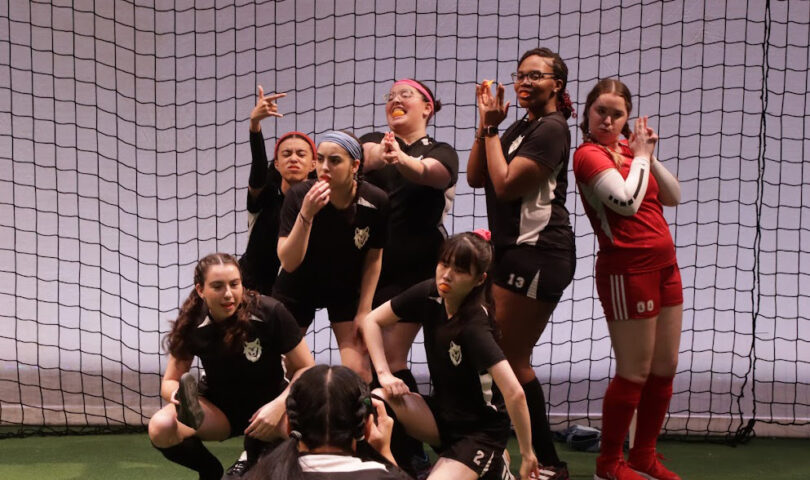The theater department put on a new show in the Sharp Theater that’s bound to spark some laughter and gasps. “The Wolves,” written by Sarah DeLappe and directed by theater professor Terra Vandergaw, follows multiple stories about a girls’ indoor soccer team.
This is a sort of passion project for Vandergaw as she mentioned in an email with The Ramapo News that she had been wanting to put on this production for years. It has been a successful play that was even a finalist for the 2017 Pulitzer Prize for Drama.
At first, there were bumps when it came to preparing the production, but Vandergaw mentioned how the staff was able to get through it in the end.
“Early on in the rehearsal process, we lost five cast members, all for different reasons. I’ve never experienced anything like that happening before, and it was nerve-wracking finding replacements,” she explained. “Luckily, we were able to re-cast, and I couldn’t be happier with how things turned out.”
The re-casting worked out perfectly, as each role seemed fit for each actress. The play centers around 10 high school soccer players only identified by their numbers: #11, #25, #13, #46, #2, #7, #14, #8 and #00. Each of these players have their own personal plotlines, with some being more prominent than others.
One example of a minor storyline is #2’s (Soobin Lee). Throughout the production, her teammates make comments on how skinny she is and she is accident prone, mentioning multiple times the concussions she’s had.
This insinuates that #2 potentially has an eating disorder, which is further emphasized in the middle of the play when she is left alone on the soccer field with a bag of orange slices. Once she realizes she is the only one there, the audience watches as she stuffs orange slices into her mouth, silently displaying an unhealthy relationship with food.
However, the story that seemed to stick out as a central plot involves Player #7 (Ava Cicero-Johnson) and Player #14 (Lauren Cesta). They are best friends— or, #14 is always there for #7 in what appears to be an unequal relationship. #7 is loud, foul-mouthed and extremely opinionated compared to #14’s quieter nature.
The conflict of their story involves a weekend trip to #7’s father’s ski cabin with her college boyfriend and one of his friends. #14 is somewhat nervous about the trip but goes anyway. After that, the following scene involves #14 getting angry with #7 for leaving her alone with the unknown college friend who made her uncomfortable. This leads to a blowup argument between the two, with #7 calling #14 “a prude.”
The ending to the story is unexpected, to say the least. While watching, I personally thought we would watch them emotionally grow, even if it was in separate ways. However, the final scene involves the team gathering on the field unable to talk about an incident that recently took place.
As the conversation unfolds and more players arrive at the field, it’s revealed that #14 died. The play ends with #14’s mother talking to the team about their last conversation — revealing #14’s name is Megan — before running to her car to grab something. When she returns, she holds up a bag of orange slices much like the one #14 brought to the field earlier in the show.
Cesta shared in an email what her experience was like practicing for the role and her connection to #14. Practice involved not only script readings but also stretches and soccer drills.
Cesta, getting the idea from co-star Marissa Costa (#46), took a Myers-Briggs Type Indicator (MBTI) test to delve deeper into her character’s personality. There was a connection built between the two, which made #14’s plotline all the more heartbreaking.
“14 finally stands up for herself only for it to end tragically. It’s personally a huge eye opener for me. I think it’s great to find that growth within yourself, and while the sad ending is necessary, it really hurts,” she stated.
The set, designed by senior theater student Joe Austria, was another interesting aspect of the show. The audience was seated on the stage in chairs surrounding a small indoor soccer field made of AstroTurf, a long black net hanging at the back of the stage and wooden walls surrounding the field painted in green, black and white.
The story focused on the influence people can have on one another and the tests of teenage friendship as they are trying to figure out their lives. Vandergaw hopes those who see “The Wolves” will come away feeling more empathetic towards others and recognize the talent here at Ramapo.
If you are interested in catching a showing, there will be one tonight, tomorrow and Saturday at 8 p.m.
pbortner@ramapo.edu
Featured photo courtesy of @rcnjtheater, Instagram






